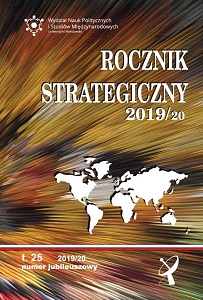
ROZWÓJ I POZYCJA NAUK ŚCISŁYCH W 30-LECIU
The consequences of the 1989 political transformation for science in Poland arepresented on the example of research in the area of high-energy physics.
More...We kindly inform you that, as long as the subject affiliation of our 300.000+ articles is in progress, you might get unsufficient or no results on your third level or second level search. In this case, please broaden your search criteria.

The consequences of the 1989 political transformation for science in Poland arepresented on the example of research in the area of high-energy physics.
More...
This article studies path-breaking economic developments in Poland followingthe start of the systemic transformation in 1989. Three groups of countries are usedfor comparative analysis: those economically most advanced, those less developedbut striving to catch up during the last 30–40 years, and as a subgroup of the latter,the transition economies. The article has three objectives. The fi rst is to show that manyopinions regarding major aspects of the Polish transformation are at variance with plainstatistical facts. The second is to evaluate the pace and the extent of progress so farin the eff ort to narrow the income and wealth gaps between Poland and most developedcountries, particularly the pre-2004 members of the European Union. The third consistsin a discussion of factors which are likely to impede the pace of Poland’s economicdevelopment in the years to come.
More...
The aim of the text is to analyze the main goals and strategies of cultural politicsin Poland in the period 1989–2019. The most important tendencies observed arethe contradictory actions taken by diff erent political authorities towards centralizationand de-centralization of culture’s management. These opposite tendencies representat least two major ways of looking at the fi eld of culture, which, on the one hand,is perceived as a political tool serving to create a sense of national identity, and onthe other, as an autonomous value which should be separate from all possible politicalinfl uences. The article analyzes the transition from the moment of the fi rst postcommunistre-discovery of artistic freedom to the present day, when right-wingpoliticians strive to replace culture’s management with history-based politics.
More...
The evolution of Polish defence policy and strategy after 1989 has had three mainphases. In the 1990s, the most important problem was the independence of Polishthinking and strategic practice after four decades of incapacitation in the conditionsof membership in the Warsaw Pact. The fi rst fi fteen years of the 21st century werea time of allied integration in NATO and the EU. Since 2014, there has been a periodof strategic adaptation to new security conditions, including hybrid threats, imposedby Russia’s confrontational policy towards the West. During this period there hasalso been a radical internal change in Polish politics related to the rise to powerof the Law and Justice party. The most important challenges in the fi eld of defencepolicy and strategy today are: ensuring a state rather than party approach to nationalsecurity, restoring international credibility, especially among NATO and EU allies,and repairing civilian and democratic control over the armed forces.
More...
The fi rst three decades after the fall of communism proved to be a good time forPoland’s security, which greatly benefi ted from the relaxation of international politics,and rebuilt its sovereign foreign and security policy. The country effi ciently reorganizedits relations with its neighbouring states, consolidated its own borders and rejectedold military and economic alliances. The net cost of this process was the lastingand progressive deterioration of relations with the heir of the Soviet Union and the largestneighbour – the Russian Federation. Rationalization and reduction of the armed forceswas possible due to progressive demilitarization of security in Europe, and it helpedrelease funds for other state needs. The processes were made possible thanks to a broaddomestic political consensus. The Polish transformation, although socially costly, hasmade it a democratic, free-market, and pluralistic state, strongly anchored in NATOand the EU as well as in regional cooperation, and selectively engaged in the globalagenda. Overtime, Poland has become a respected member of the Western communityof states, occasionally punching above its weight in transatlantic relations.
More...
The article presents the fundamental political confl icts that have structured Poles’electoral preferences in the last thirty years. The author indicates deep-seatedeconomic, social and political reasons of the confl icts. Based on Lipset and Rokkan’sclassical theory of socio-political cleavages, he states that the dynamics of Poles’electoral preferences in 1989–2020 has been shaped by three basic distinctions.In the years 1989–2001, the postcommunist cleavage had the most fundamentalimpact; in 2005–2011, the division between liberal Poland and solidary Poland cameto the fore, and in 2015–2020, voters’ political choices were determined by the enmitybetween two camps: the supporters and the opponents of the Law and Justice party(PiS). The essence of the latter cleavage is, on the one hand, a very strong identifi cationof many millions of Poles with the ruling Law and Justice, and on the other hand, anequally strong hostility towards the party evident in a similar portion of the population.
More...
After 1989, Poland’s regime, its political system, governing mechanisms, and itsadministrative system have undergone a peaceful change of a revolutionary nature.The rejection of the solutions typical of a socialist state and their replacement withmechanisms of a democratic state, governed by the rule of law, has progressed in threestages: systemic changes, European transformation, and qualitative modernization.The economic system as well as the organization, principles, and standards of operationof public institutions have been radically reshaped. Three constitutional regimes havesucceeded one after another. On the political scene, after a period of fragmentation,there emerged two blocs, both internally non-uniform and strongly opposed to oneanother. Bitter rivalry surfaced between the supporters of the liberal and pro-Europeandirection and the proponents of the conservative project that emphasized particularismsand focused on threats to national interests. Poland’s parliamentary cabinet system,with its separation of powers, dual executive and a strong local government, gave riseto a polycentric, multilayered and multilane model of government that was fi rmlygrounded in a constitutional model but still not immune to threats in practice. After2015, political power has been given to the leader of the biggest party in the Parliament,who is free of any constitutional responsibility; attempts to do away with the separationof powers have also got more aggressive. The will of the people has been interpreted assynonymous with immediate interests of the dominating party. Attempts to eliminateminority voices from the discussion of public matters have been many and evident.The overall positive outcome of the Polish transformation does not excuse the researcherfrom evaluating in an exhaustive manner and continuously identifying the criticalpoints and strategic challenges that Poland faces in the domain of governing.
More...
Foreign policy of independent Poland after 1989, at a time when the previous bipolarsystem was disintegrating and America had its unipolar moment: priorities, buildingof the foreign service before joining NATO and the EU; shaping of the new internationalorder in the beginning of the 21st century, growing uncertainty and unpredictabilityin international relations, Law and Justice’s and its political satellites’ foreign policy;threats to Polish national interests.
More...

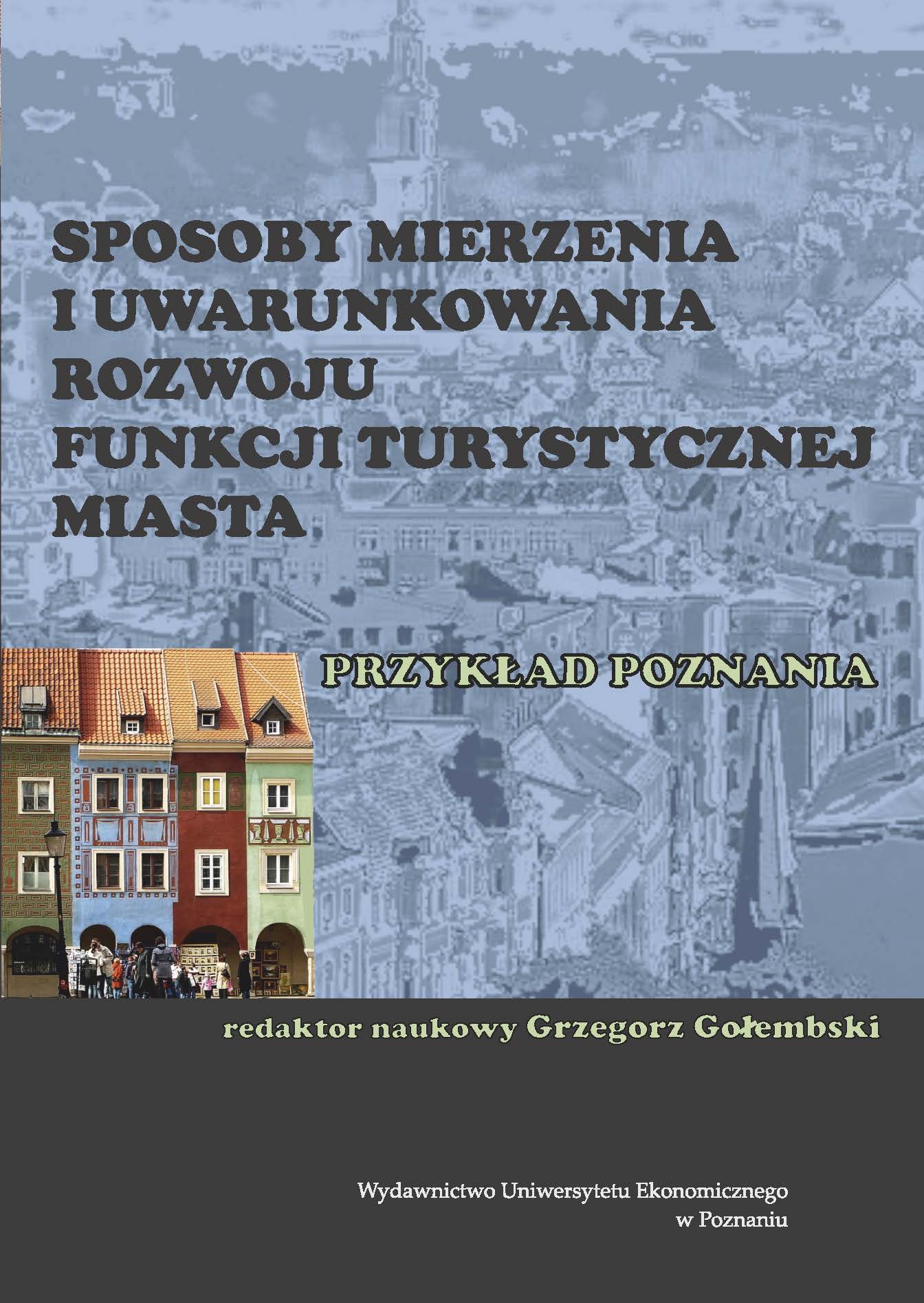
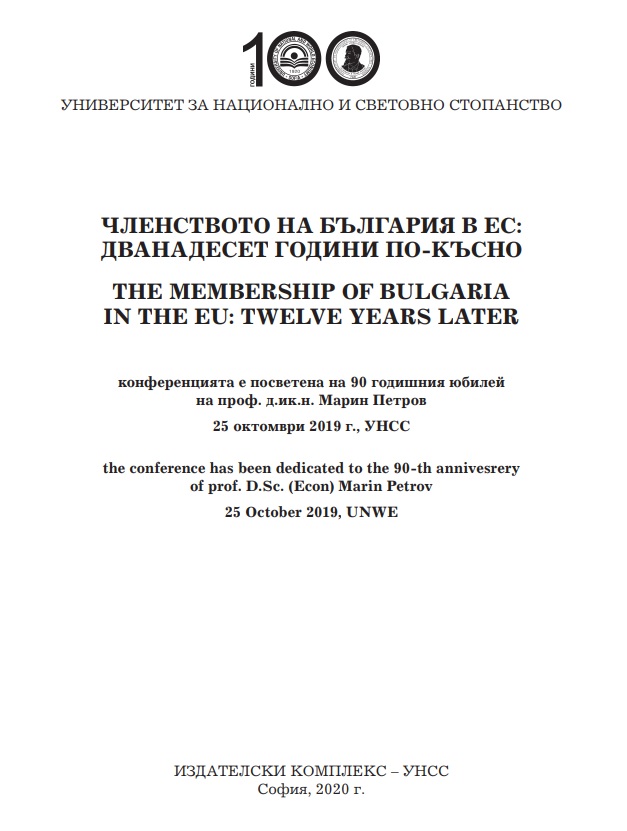
The political and the institutional systems of the European Union (EC, the Union) are complicated system organized on many levels – regional, national and European. Many factors affect the organization and the functioning and the EC institutions face continuously in their work challenges and have to solve new arising problems in the current dynamic world. The normal work and the future development of EU as a unique political and economic organization of voluntarily joined European countries depends vastly on the institutional system abilities (capacity) to take on time efficient short-term and perspective decisions. We have tried in the present article to identify and to classify the most important challenges in the current development and the main factors – external (global) and internal, affecting the Union and as well as their complex effects and consequences.
More...
Clusters are an important element of Europe‘s industrial landscape. In the recent years, clusters have become increasingly central to European Union and member – states policy as instruments for improving the competitiveness of local industries and fostering the innovative potential of small and medium-sized enterprises. However, in some countries, the result of implementing these measures and policies does not have the expected positive economic impact. Unfortunately, this is the case of Bulgaria, which necessitates the need to analyze the cluster policy implemented in the country. The main aim of this article is to analyze and evaluate the effectiveness of the implemented policy and the instruments for support the development of clusters in Bulgaria from 2004 to the present, identifying the challenges and making recommendations for improvement. In the article, the author makes reference to the good practices in the implementation of cluster policy at the level of the European Community and member- countries and outlines possibilities for increasing the efficiency of the implemented state cluster policy.
More...
Over the last few decades, a global revival of the Islamic economy is observed. Islamic economics and finance are not unusual terminology and philosophy at present. Since the last global financial crisis (2007- 2008), a great deal of attention has been paid to this issue by a number of scientists and specialists around the world. There is a striving to identify a new economic paradigm with the pretense of finding a solution to existing economic problems. Predominantly Islamic, but not only, scientists are arguing about the ability of the Islamic economy to turn into the political and economic science of finding the necessary solutions. The purpose of this publication is to point out facts and try to compare the contemporary Islamic economics to the other political economies.
More...
The centralization of fiscal policies in the European Union (EU) countries is an ongoing process that has gained particular importance as a result of the last financial and economic crisis of 2008-2009. The approaches for conducting fiscal centralization as well as the level of delegation of competences are fostering a discussion about the architecture of the optimal fiscal union as part of the Economic and Monetary Union (EMU) within the EU. The cornerstone of the debate is how to make it possible for the national governments to possess with sufficient fiscal instruments and space while at the same time avoiding risks of excessive budget deficits. The establishment of advisory expert bodies was one of the steps the EU has taken to better coordinate national governments in regards to the sound management of public finances and transparency in the reporting and implementation of national budgets. The activity of the Fiscal Council in Bulgaria is regulated by law, but its opinions and conclusions are non-binding. Independent experts carry out a critical review of the implementation of the government’s fiscal program, provide evaluation and recommendations. However, the government does not have to comply with them. The question is whether this needs to change and, if so, will fiscal councils serve as a more federal form of control over national governments’ budgetary policies?
More...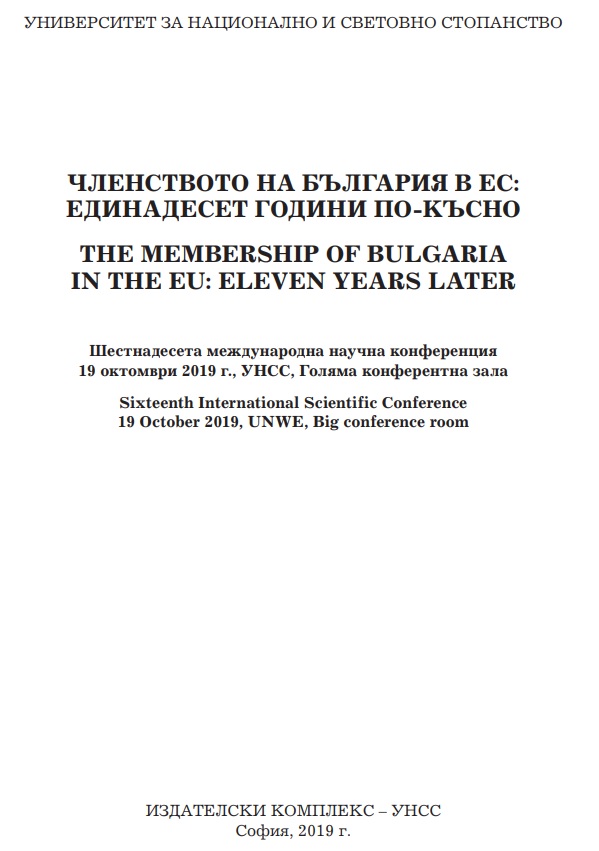
In this paper we conduct an analysis of the legislative solutions related to the establishment of a dedicated register of trade union organizations and the organizations of the employers. In the aspect of the present legislative hypothesizes author concludes about the specifics, necessity and the impact of the register requirement considering the principles of stability and transparency in the social dialogue field.
More...
USA and China are the two biggest world economies and, to a great extent, they determine the trends in the global economic development course. The relationship between USA and China resembles Yin and Yang – they are constantly struggling for power while at the same time cannot be without each other. China is the biggest creditor to USA which on its side is an important export market for China. In this paper the author is analysing the reasons, development and future of the USA-China economic partnership. Author’s thesis is that, despite the power battles between USA and China, it is in the common interest of both countries to continue their inter-dependent economic policies beyond the repercussions from the trade and economic disputes. This paper is a brief version of the Master’s degree thesis where author reviews in greatest details the economic relations between USA-China and substantiates the above thesis.
More...
Conducting various assessments is an important element of the implementation of the European Structural and Investment Funds. There are clearly defined goals and responsibilities for the evaluations in each programming and implementation cycle (preliminary, intermediate and subsequent). The implementation of the evaluation process in many countries from Central and South-eastern Europe is a result of the requirements noted in the regulations on the European Structural and Investment Funds. The aim of this paper is to present the role of the theoretical and methodological knowledge in the public financing programs assessment, to review the main methods for conducting an impact assessment as well as to conduct a comparative analysis on these methods.
More...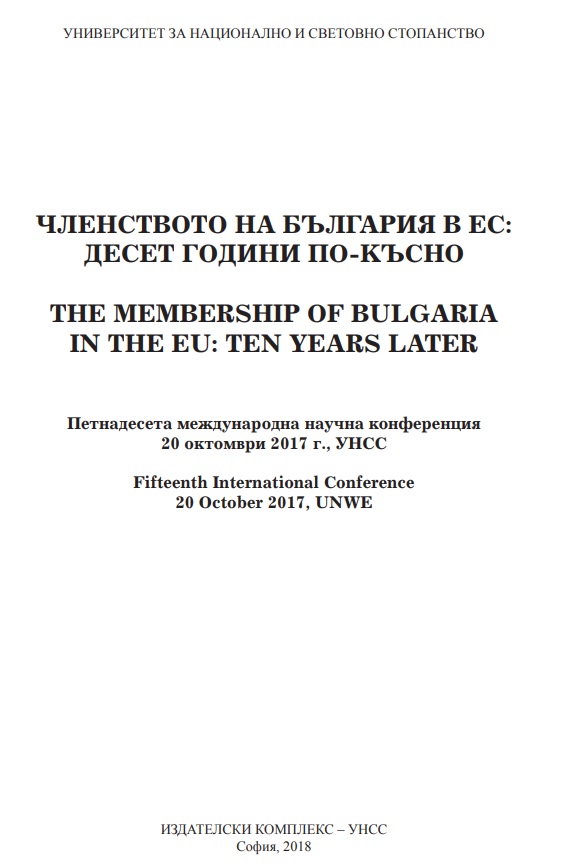
The problem is positioned within the context of the huge social and economic inequality on EU level as well as to a greater extent in Bulgaria at the beginning of XXI century. The process of oligarchization of the liberal democracy is explained simultaneously in the EU and Bulgaria (giving examples of institutions and practices), highlighting the following mechanisms of transformation: a) from parties to lobbies; b) from separated powers (institutions) to their corporate capture; c) from formal liberal rights of the majority to the right of wealth for the few. In conclusion, a need of taking an anti-oligarchic political action course is outlined – a course of democratic dispersion of public goods and economic prosperity for the majority of the citizens.
More...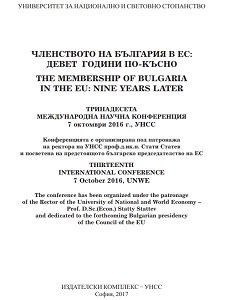
Bulgaria has been conducting a vivid and consistent policy since 2012 in regards to the harmonization of the electricity market with the European standards as stipulated in the EU’s Third energy package. The first step into this direction was the adoption of national legislative changes transposing Directive 2009/72/EC of the European Parliament and of the Council requirements and adapting them to the national energy sector specifics. The changes include all key requirements by the EU and, most of all, the selection of a model to separate the electricity transit from the chain of production and delivery. Bulgaria has adopted the model of an independent transmission operator where the ownership and the management of the electricity grid are mandated to a certified company which is part of the vertical integrated company and it meets certain conditions for independence. Along with those changes, the national legislature pays attention to consumer protection, enhanced the role of the national regulator and encouraging cross border partnerships. The adopted legal texts serve as a fundament for the process of electricity market liberalization which shall be continued with certain actions by both the regulator and the market participants. The article reviews the positive changes which had occurred in the recent years during the implementation of the requirements for more competitive, efficient and secure market. To latter we could refer the separation and certification of Electricity System Operator EAD as an independent transmission operator, establishment of the Independent Bulgarian Energy Exchange, implementation of a free deregulated energy trade segment and accommodating opportunity for the consumers to choose their energy supplier. In conclusion, the article turns attention to still existent serious issues and challenges to the Bulgarian energy sector liberalization which shall be addressed.
More...